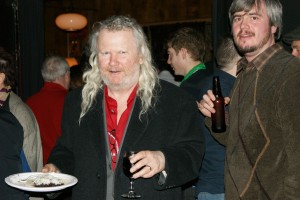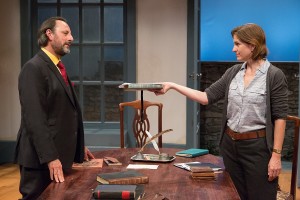How well does an opening night performance reflect a month-long production as most audience members will see it? Is there a unique culture to opening nights which colors reviews of a production? How can we continue a critical conversation about a play after the initial flurry of reviews? Where is the free booze? Phindie writer Michael Fisher considers these questions, and more, in a multi-part critical experiment. The Lantern Theater Company’s production of ARCADIA is his guinea pig subject.
—
“The Experiment”: An Introduction
When I started writing regularly for Phindie more than a year ago, one of the more enticing perks of the job was the free booze.

When you’re a critic, they put your name under “press” at the will call counter. There’s a weird sort of shame in this, because it feels like, just by collecting your tickets, you’re insisting that you’re on a different intellectual level than the rest of the audience. And sometimes you get a glossy folder full of promotional materials to carry around, as if to announce to everyone in theater that you’re here for reasons that supersede mere enjoyment. You may as well be wearing a long black robe and curly wig, because everyone can see you’ve come to hear the evidence and hand down a swift verdict on the show you’re about to see. Deep as my love remains for the theater and for writing criticism, the idea that people know who I am and why I’m there has always been nerve-wracking.
The consolation, however, is that theater companies tend to invite the critics on opening night. And opening night is typically appended at the far end with a reward of free drinks and hors d’oeuvre to celebrate the public unveiling of the production—a respite for the cast and crew between the exhausting repetition of several weeks of rehearsals and the exhausting repetition of several weeks of performances—to which audience members are generously invited. When I attended my first opening night, I couldn’t believe these fine people were just letting me take all this stuff. I ate a handful of olives and slammed down three plastic cups of wine (two red, one white, because why not?) before rushing to hop a train, where I composed a mostly negative review on my iPhone.
It was at one such opening that my girlfriend Angela and I came into conversation with Kathryn MacMillan, associate artistic director at Lantern Theater Company and a friendly acquaintance. Somehow or other we came upon the topic of theater criticism, specifically the opening night culture and its effect on the companies that get reviewed. Ms. MacMillan brought up a point that I am embarrassed to say had never occurred to me: It’s fine and dandy that critics come out to review a show in its celebratory opening phase, but where does that leave our beloved theater companies a few weeks into the run? That’s when they really need the press, after all. Even if a production is greeted with a chorus of outstanding reviews, those reviews generally all come out on the same day, and that day is usually the Friday after opening. The bulk of a typical theatrical run, then, happens when nobody’s really talking about the show anymore.
So perhaps a production would be better served by a mid-run review in addition to the initial critical response. Well and good.

But there’s more to it than that. Unlike movies and albums, theatrical productions aren’t granted a canned posterity on Netflix and iTunes. Live shows are never in a fixed state; they congeal into being, changing from performance to performance, and then are gone a month later. The only people who get the full experience, in this sense, are the cast and crew. Critics watch a performance happen, but rarely do they see the production grow. We get an experience that can’t possibly be complete, even if it’s relatively accurate.
We wondered aloud if there was a better way of doing it. The answer we came up with was: Maybe.
The idea was posed to review a production similar to how a food critic reviews a restaurant: visiting a few times, rather than just once, and forming an opinion that incorporates the change that happens across multiple experiences with something that is the same yet different each time. There’s the opportunity for change within the production, of course, but also within the critic. New discoveries can be made, new realizations formed during subsequent viewings that couldn’t possibly have surfaced during a single opening performance, distorted as it tends to be by the critic’s judgmental lens. Better to relieve the critic of that pressure and allow him or her to get to the bottom of something for once. The cast has had its time with the play; that the critic gets but a single night in which to absorb everything the production has to offer seems somehow cockeyed.
As a guinea pig for this experiment, Ms. MacMillan offered up her production of Tom Stoppard’s ARCADIA at the Lantern. It opened two weeks ago and has two weeks and change left to go. Yesterday was my first viewing.
So…what are we doing here, exactly?
Basically: I’m going to see ARCADIA a few times. After each viewing, I’ll share my impressions, with the emphasis weighted toward later viewings, since by then I’ll have formed a more robust picture of the production in my brain. At the end I’ll make some conclusions and try to determine how successful the experiment was in terms of benefiting the audience, the company, and myself. Think of it as a meal, consisting of several courses. Consider this your appetizer.

During yesterday’s talkback session, Ms. MacMillan mentioned that Stoppard has said he wants his audiences to be as smart as he is. If he was serious, I doubt he’s been able to avoid disappointment in the filling of such a tall order. But thinking back on the maelstrom of terms and theorems and references that forms the narrative backbone of ARCADIA, I wonder if that’s really what he meant. Because I think what he really wants, and what his plays really demand, is that the audience be willing. Willing to learn, willing to roll with the narrative, willing to use their deductive faculties to extract the meanings from Stoppard’s many obscurities. And of course we are always willing because Stoppard rewards us with wit and depth and enough philosophical debate to keep us occupied until long after the play has ended.
In searching the internet for confirmation of Stoppard’s stance toward his audience, I came upon another quote from the playwright: “I like trying to create a spark through a collaboration between the audience and me.”
Our task, then, is to make the collaboration as thorough and evenhanded as possible. If we’re lucky, there will still be free drinks at the end.
- Read Part 1, Part 2 and Part 3 of this multi-part review experiment
- Christopher Munden’s review of the opening night performance of ARCADIA.
- Phindie writer Kathryn Osenlund’s review for CurtainUp.
